Building Automation System Market Research, 2030
The global building automation system market was valued at $75.8 billion in 2021, and is projected to reach $194.9 billion by 2030, growing at a CAGR of 10% from 2022 to 2030. Building Automation Systems (BAS), also known as Building Management Systems or Building Control Systems, are systems that regulate numerous electrical, electronic, and mechanical systems all throughout a building. It is a distributed control system that unites several building system types into a single and central location. Building automation systems are typically used to operate the HVAC (Heating, Ventilation, and Air Conditioning) systems in a building, but they are also used to regulate the lighting, security, and other systems in the building.
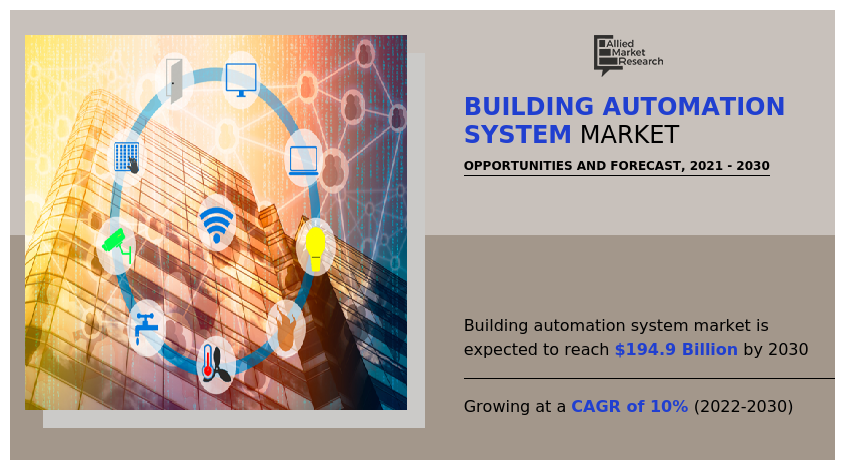
The building automation system market is segmented into Application, Offerings and Component.
Rising security concerns and increasing demand for integrated security and monitoring solutions are projected to drive growth of the global building automation systems market over the forecast period. Security and access controls have the largest revenue share in the global building automation industry. These services include safety-critical e.g., fire or social alarm systems and security-critical e.g., intrusion alarm.
Installation, monitoring, and maintenance of building automation systems necessitate the use of experienced professionals, which are difficult to find. Furthermore, there are queries regarding long-term system returns among users, which is projected to affect demand for BAS. Furthermore, issues such as managing a large number of devices and apps with varying functionality have resulted in misunderstandings about the oversight of diverse operations. As a result, these issues are projected to stifle market growth in the near future. These factors are anticipated to drive the building automation system market growth in the near future.
Building automation systems used to run independently on a separate network, which was not a cost-effective or efficient model for building operation. Building automation solutions, on the other hand, are now being combined with traditional building automation systems. Furthermore, integrating security systems will provide additional benefits such as advanced administration, cost savings, improved communication across building management modules, and decreased incident response time. During the predicted period, this tendency is likely to continue.
The key players profiled in this report include building automation system, including Honeywell International Inc., Robert Bosch GmbH, Johnson Controls, Mitsubishi Electric Corporation, ABB, Schneider Electric, Siemens, General electric, Hubbell, and United Technologies Corporation.
The global building automation system market is segmented on the basis of component, application, offerings, and region. By component, the market is sub-segmented into hardware and software. By application, industrial, residential, and commercial. By offerings, the market is classified into facility management systems, security & access controls, fire protection systems, building energy management software, bas services, and others. By region, the market is analyzed across North America, Europe, Asia-Pacific, and LAMEA.
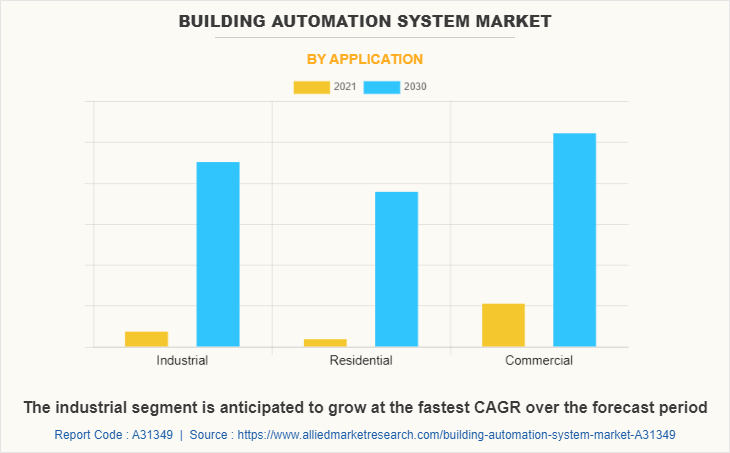
By application, the commercial sub-segment dominated the global building automation system market share in 2021. A commercial building automation system is a network of switches and sensors that communicate with a building's primary internal system, including its lighting, ventilation, heating and cooling, and fire prevention measures, among others. Commercial building automation systems operate all of the associated systems from a central system for utilizing current building automation systems that serve as a central control for the systems. Such applications of building in the automation sector are bound to create a scope of growth for the sub-segment during the building automation system market forecast period.
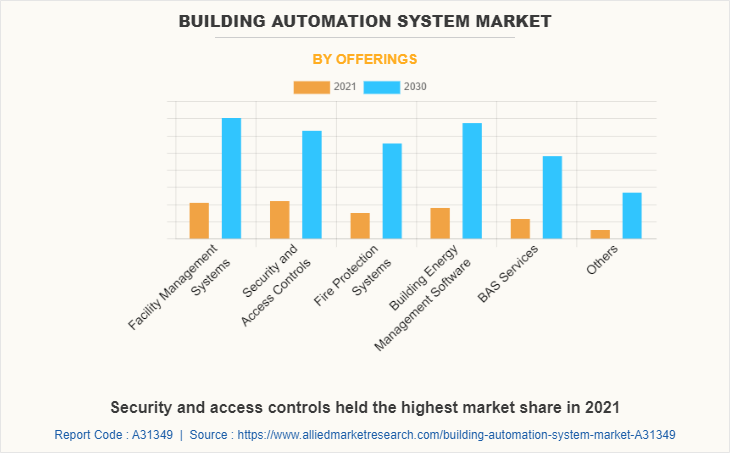
By offerings, the security access control sub-segment dominated the global building automation system market share in 2021. Security and entryway management maintain a close eye on the area that aids in controlling, managing, and gaining access to the control panels for security is a handy manner, which is anticipated to fuel the sub-segment growth over the projected time. These are predicted to be the major factors dominating the building automation system market size during the forecast period too.
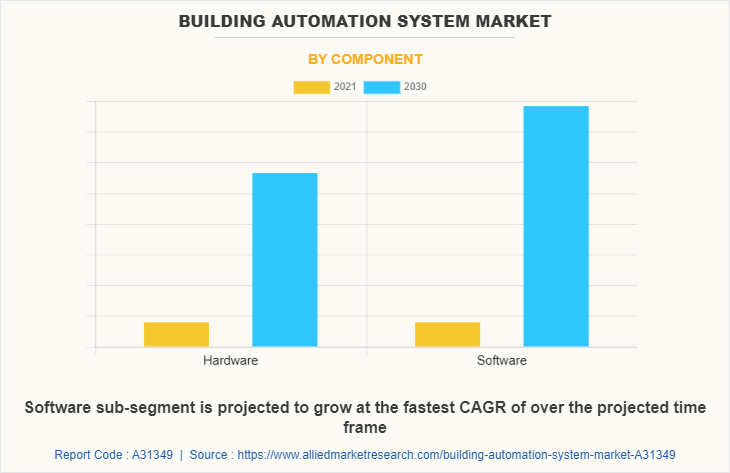
By component, the software sub-segment is projected to be the fastest-growing during the forecast period. The building automation systems are interlinked with a software that helps to monitor and control the automation systems implemented in the building. Increasing use of software in the BAS is predicted to drive the sub-segment growth in the estimated period. Increasing a number of software uses are predicted to be the major factors anticipated fastest growth the building automation system market size during the forecast period too.
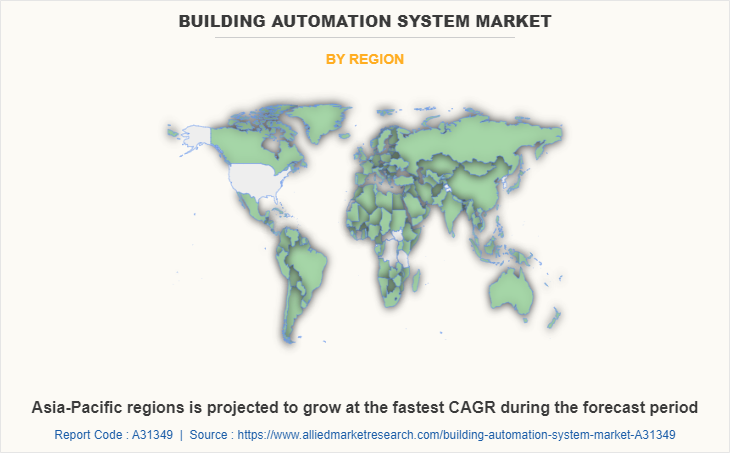
By region, North America dominated the global market in 2021 and is projected to remain the fastest-growing sub-segment during the forecast period. Increase in construction activities across the region and rise in the economy of various nations in the region is predicted to boost the region market in the estimated period. Consumers in the region are mostly interested in achieving energy efficiency through the introduction of building automation systems, which is directly proportional to monetary savings. Smart cities are rapidly being built in countries such as the U.S. and Canada, which is predicted to create more investment opportunities for the investors in the estimation period.
Impact of COVID-19 on the Global Building Automation System Industry
- COVID-19 pandemic positive impact on the building automation industry has gained more popularity in industrial and residential buildings. Work-from-home and home offices have increased the standard of living. This has developed and prompted customers' desire for an automated and hassle-free home and living experience. People's per capita income has fallen during the COVID-19 epidemic.
- The COVID-19 has affected the price impact on the global intelligent building automation system industry, as demand has risen due to the adoption of green initiatives and smart building management systems of immense energy efficiency
- The pandemic crisis caused by the spread of the coronavirus enforced a lockdown in many nations to commence physical distance to reduce the spread. The COVID-19 epidemic has influenced individual and market behavior, with consequences for economies and communities. To fulfil market demand for medical equipment, medications, and technology-enabled service sectors, the government is concentrating on preventative measures against the pandemic and ensuring that enterprises are more focused on worker safety as well as business continuity to earn money.
Key Benefits For Stakeholders
- This report provides a quantitative analysis of the market segments, current trends, estimations, and dynamics of the building automation system market analysis from 2021 to 2030 to identify the prevailing building automation system market opportunities.
- The market research is offered along with information related to building automation system market opportunity, key drivers, restraints.
- Porter's five forces analysis highlights the potency of buyers and suppliers to enable stakeholders make profit-oriented business decisions and strengthen their supplier-buyer network.
- In-depth analysis of the building automation system market segmentation assists to determine the prevailing market opportunities.
- Major countries in each region are mapped according to their revenue contribution to the global building automation system market outlook.
- Market player positioning facilitates benchmarking and provides a clear understanding of the present position of the market players.
- The report includes the analysis of the regional as well as global building automation system market trends, key players, market segments, application areas, and market growth strategies.
Building Automation System Market Report Highlights
| Aspects | Details |
| By Application |
|
| By Offerings |
|
| By Component |
|
| By Region |
|
| Key Market Players | Hubbell Inc, ABB Ltd, United Technologies Corporation, Schneider Electric, Johnson Controls International plc, Robert Bosch, Siemens AG, Honeywell International Inc., General Electric, Mitsubishi Electric Corporation |
Analyst Review
Increase in demand for application is the key factor that is projected to drive the growth of the global building automation system market during the forecast period. In addition, rising security concerns are expected to increase demand for integrated security, during the forecasted period. Automate a facility's security and building automation systems use face recognition and video monitoring. However, the lack of skilled operators to operate, monitor, and manage building automation systems is predicted to hinder the market in the projected timeframe. Building automation systems are becoming more widely used in the hospitality industry, especially those businesses wanting to separate themselves from competition and concentrate on constructing higher international, best-in-class hotels. Wireless solutions are widely available from vendors to address crucial challenges including rising energy costs in the hospitality business.
Among the analyzed regions, North America is expected to account for the highest revenue in the market by the end of 2031, followed by Asia-Pacific, Europe, and LAMEA. Increasing investment by majority of the companies and government bodies are the key factors responsible for leading position of North America and Asia-Pacific in the global building automation system market.
Rising demand for building automation system solutions to help cut down on energy usage is anticipated to fuel the market expansion. In addition, suitable government initiatives and incentives are expected to provide lucrative business opportunities.
Commercial sub-segment acquired the maximum share of the global building automation system market in 2021.
The use of building automation system as an industrial, in commercial and residential is estimated to drive the adoption of building automation system.
Asia-Pacific will provide more business opportunities for the global building automation system market in future.
Honeywell International Inc., Robert Bosch GmbH, Johnson Controls, Mitsubishi Electric Corporation, ABB, Schneider Electric, Siemens, General electric, Hubbell, and United Technologies Corporation are the major players in the building automation system market.
The major growth strategies adopted by building automation system market players include collaboration.
The report provides an extensive qualitative and quantitative analysis of the current trends and future estimations of the global building automation system market from 2021 to 2030 to determine the prevailing opportunities.
Creating products and offering better industrial solutions are the major the major customers in the global building automation system market.
Loading Table Of Content...



